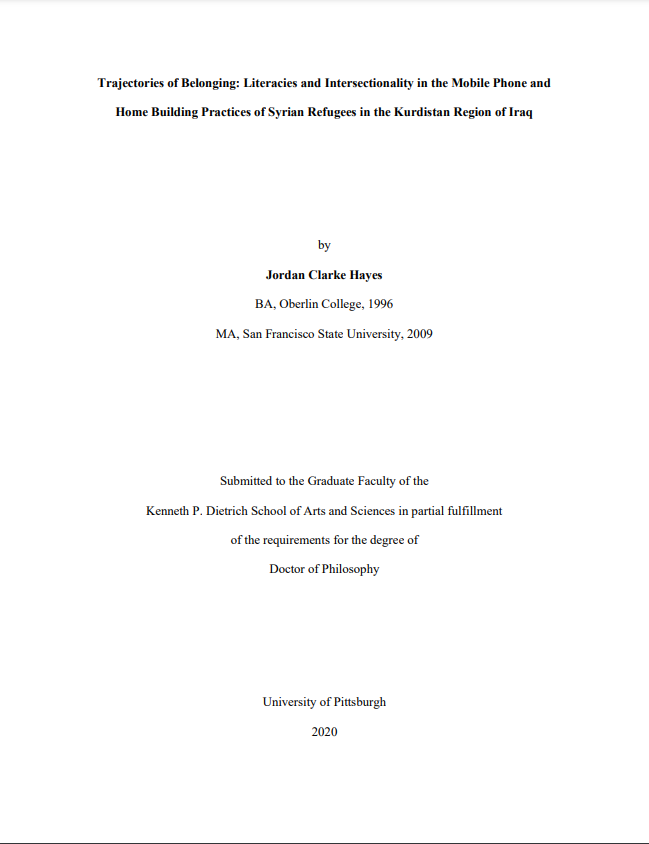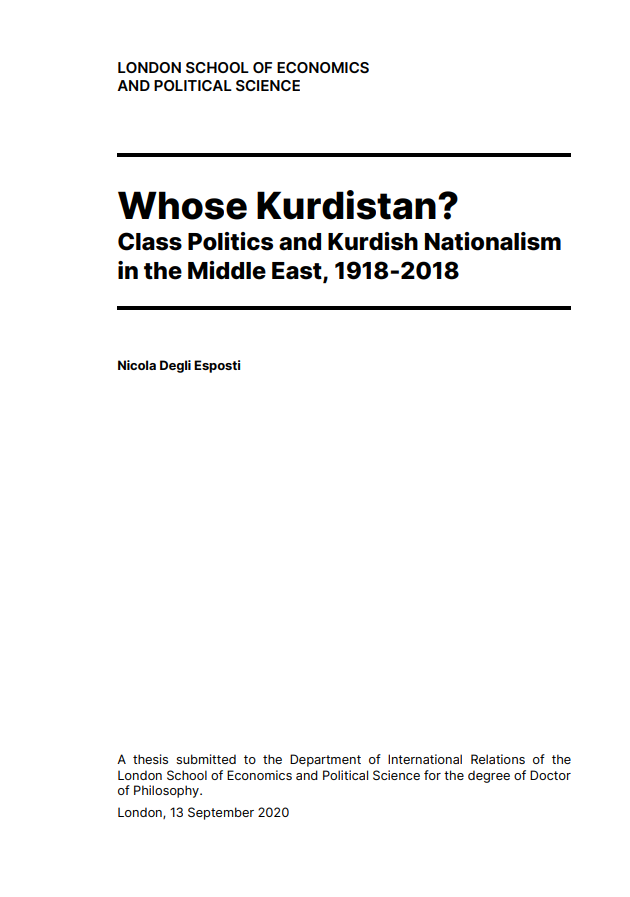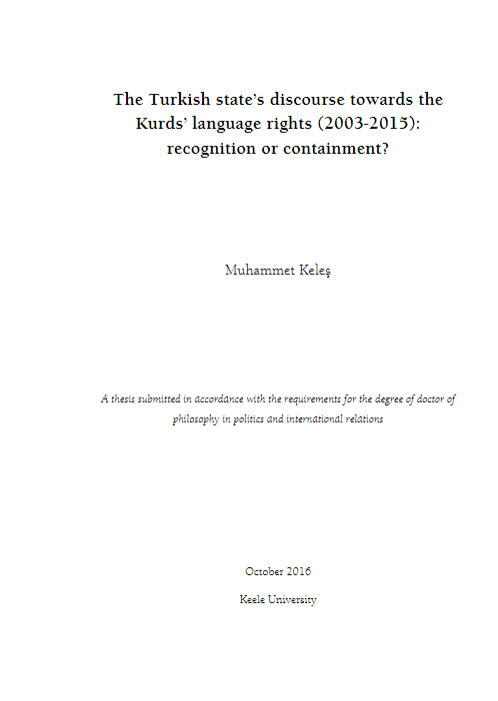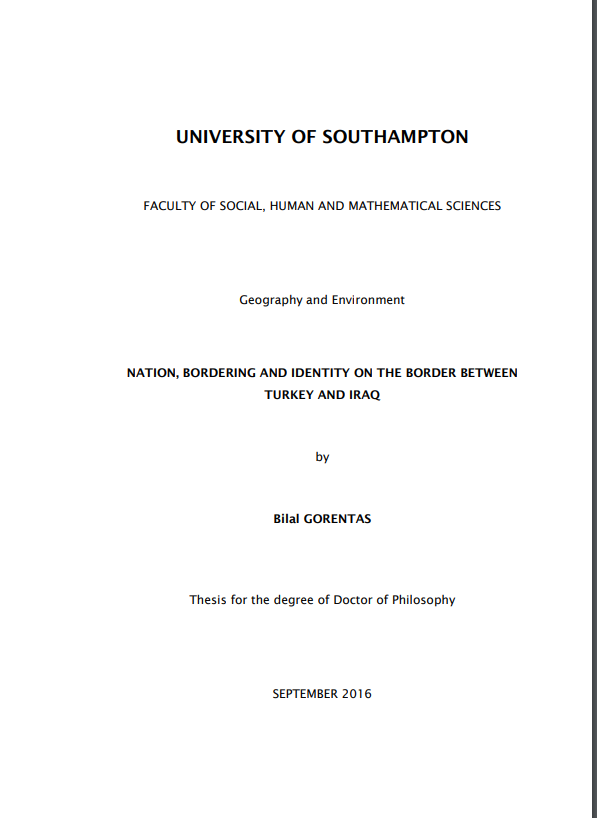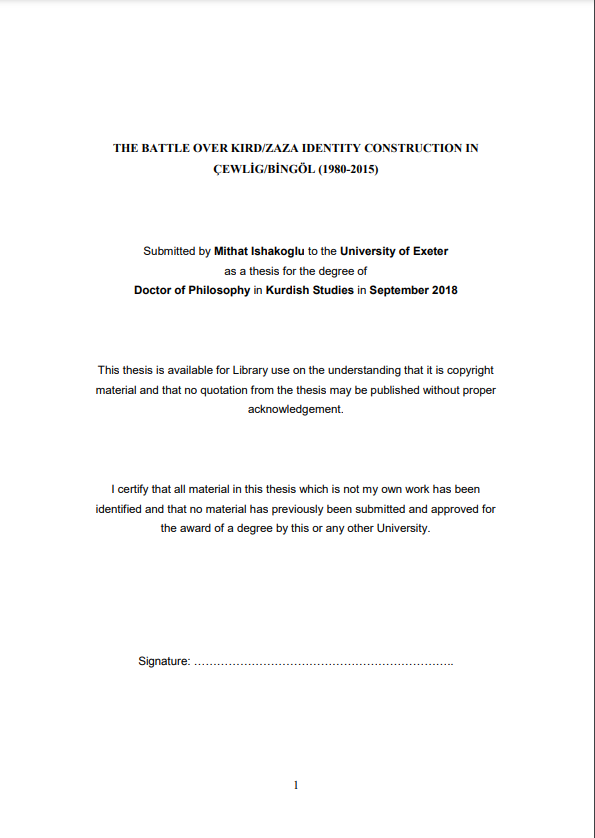“525 Terrorists Neutralized so Far in Operation Peace Spring, Erdoğan Says.” DailySabah, 13 Oct. 2019, https://www.dailysabah.com/war-on-terror/2019/10/13/490-terrorists-neutralizedso-far-in-operation-peace-spring-erdogan-says.
Abu-Lughod, Lila. “ Orientalism” and Middle East Feminist Studies. JSTOR, 2001.
Adler-Kassner, Linda, and Elizabeth Wardle. Naming What We Know: Threshold Concepts of Writing Studies. University Press of Colorado, 2015.
Agamben, Giorgio. Homo Sacer: Sovereign Power and Bare Life. Stanford University Press, 1998.
Ahmed, Sara. Strange Encounters: Embodied Others in Post-Coloniality. Routledge: Taylor & Francis Group., 2000.
Ahmed, Sarah. “Affective Economies.” Social Text, vol. 22, no. 2, 2004, pp. 117–39.
—. Uprootings/Regroundings: Questions of Home and Migration. Berg, 2003.
Ahmeen, Ahmed Omar, et al. Displacement as Challenge and Opportunity. UNHCR, 2016.
Albert, Craig Douglas. “A History of Violence: Ethnic Group Identity and the Iraqi Kurds.” Iran and the Caucasus, vol. 17, no. 2, 2013, pp. 215–34.
American University Sulaimani Iraq. “Center of Gender Development and Studies.” Auis.Edu.Krd/CGDS, N.d., https://auis.edu.krd/CGDS/.
Anand, Nikhil, et al., editors. The Promise of Infrastructure. Duke University Press, 2018.
Anonymous Email. Follow Up. 8 Aug. 2018.
Anthias, Floya. Identity and Belonging: Conceptualisations and Political Framings. no. KLA Working Paper Series 8, 2013, pp. 1–24.
—. “Intersectional What? Social Divisions, Intersectionality and Levels of Analysis.” Ethnicities, vol. 13, no. 1, Feb. 2013, pp. 3–19.
Anton, Samuel. “The Seven Regions of the Autonomous Administration of North and East Syria.” Wikimedia Commons, 7 May 2020, https://commons.wikimedia.org/wiki/File: Regions_of_the_Autonomous_Administration_of_North_and_East_Syria.png.
Arendt, Hannah. “We Refugees.” Menorah Journal, vol. 31, no. 1, 1943, pp. 110–19.
Arnold, Tom. “Kuwait’s Agility and France’s Orange Sue Directors of Iraq’s Korek.” Reuters, 15
Mar. 2018, https://www.reuters.com/article/pws-orange-korek/kuwaits-agility-andfrances-orange-sue-directors-of-iraqs-korek-idUSL8N1QW3WG.
Assmann, Jan. “Communicative and Cultural Memory.” The Theoretical Foundations of Hungarian “lieux de Mémoire” Studies, 2013, pp. 36–43.
Assmann, Jan, and John trans. Czaplicka. “Collective Memory and Cultural Identity.” New German Critique, no. 65, 1995, pp. 125–33. JSTOR, JSTOR, doi:10/cg9vct.
Azeez, Hawzhin. “From Nouri to the YPJ: Evolving Visions of Kurdish Femininity.” Hawzhin
Azeez, 5 Dec. 2018, http://hawzhin.press/2018/12/05/from-nouri-to-the-ypj-evolvingvisions-of-kurdish-femininity/.
Balanche, Fabrice. “Rojava’s Sustainability and the PKK’s Regional Strategy.” The Washington
Institute, 24 Aug. 2016, https://www.washingtoninstitute.org/policy-analysis/view/ rojavas-sustainability-and-the-pkks-regional-strategy.
Bartholomae, David. Writing on the Margins: Essays on Composition and Teaching. Palgrave Macmillan, 2005.
Bartholomae, David, and Anthony Petrosky. Facts, Artifacts, and Counterfacts: Theory and Method for a Reading and Writing Course. Heinemann, 1986.
Bartlett, Lesley. “To Seem and To Feel: Situated Identities and Literacy Practices.” Teachers College Record, vol. 109, no. 1, Jan. 2007, pp. 51–69.
Bazerman, Charles, and Paul Prior. “Participating in Emergent Socio-Literate Worlds: Genre, Disciplinarity, Interdisciplinarity.” Multidisciplinary Perspectives on Literacy Research, vol. 2, 2005, pp. 133–178.
Betts, Alexander. The Influence of New Actors in the Global Refugee Regime. Global Refugee Policy Network, 2015, https://www.youtube.com/watch?v=ZHtAzHooCOo.
Betts, Alexander, and Paul Collier. Refuge: Rethinking Refugee Policy in a Changing World. Oxford University Press, 2017.
Bilge, Sirma. “Intersectionality Undone.” Du Bois Review: Social Science Research on Race, vol. 10, no. 02, 2013, pp. 405–424.
Blommaert, Jan. “Sociolinguistic Scales.” Intercultural Pragmatics, vol. 4, Jan. 2007, pp. 1–19.
—. The Sociolinguistics of Globalization. Cambridge University Press, 2010.
Bookchin, Debbie. “Report from Rojava: What the West Owes Its Best Ally Against ISIS.” The
New York Review of Books, 4 Apr. 2019, https://www.nybooks.com/daily/2019/04/04/
report-from-rojava-what-the-west-owes-its-best-ally-against-isis/.
Bookchin, Murray. Post-Scarcity Anarchism. Ramparts Press Berkeley, 1971.
—. The Next Revolution: Popular Assemblies and the Promise of Direct Democracy. Verso, 2015.
Borkert, Maren, et al. “The Best, the Worst, and the Hardest to Find: How People, Mobiles, and
Social Media Connect Migrants In(to) Europe.” Social Media + Society, vol. 4, no. 1, Jan. 2018, pp. 1–11.
Brah, Avtar, and Ann Phoenix. “Ain’t I A Woman? Revisiting Intersectionality.” Journal of International Women’s Studies, vol. 5, no. 3, May 2004, pp. 75–86.
Braithwaite, Alex, et al. “Refugees, Forced Migration, and Conflict: Introduction to the Special
Issue.” Journal of Peace Research, vol. 56, no. 1, Jan. 2019, pp. 5–11. SAGE Journals, doi:10/gftqxs.
Brandt, Deborah. Literacy as Involvement : The Acts of Writers, Readers, and Texts. 1990.
—. Literacy in American Lives. Cambridge University Press, 2001.
Brandt, Deborah, and Katie Clinton. “Limits of the Local: Expanding Perspectives on Literacy as
a Social Practice.” Journal of Literacy Research, vol. 34, no. 3, 2002, pp. 337–356.
Brannon, Lil, et al. “EJ Extra: The Five-Paragraph Essay and the Deficit Model of Education.” The English Journal, vol. 98, no. 2, 2008, pp. 16–21.
Bruce, Caitlin. “The Balaclava as Affect Generator: Free Pussy Riot Protests and Transnational Iconicity.” Communication and Critical/Cultural Studies, vol. 12, no. 1, Jan. 2015, pp. 42–62.
Brun, Cathrine. “Dwelling in The Temporary: The Involuntary Mobility of Displaced Georgians in Rented Accommodation.” Cultural Studies, vol. 30, no. 3, May 2016, pp. 421–40.
Brunwasser, Matthew. “A 21st-Century Migrant’s Essentials: Food, Shelter, Smartphone.” The New York Times, 25 Aug. 2015.
Burnett, Catherine, et al. “Closing the Gap? Overcoming Limitations in Sociomaterial Accounts of Early Literacy.” Journal of Early Childhood Literacy, Dec. 2019, doi:10/ggk54w.
Burnett, Cathy, et al. “The (Im)Materiality of Literacy: The Significance of Subjectivity to New Literacies Research.” Discourse: Studies in the Cultural Politics of Education, vol. 35, no. 1, Jan. 2014, pp. 90–103, doi:10/gfvpv2.
Burnett, Cathy, and Guy Merchant. “Literacy-as-Event: Accounting for Relationality in Literacy Research.” Discourse: Studies in the Cultural Politics of Education, vol. 41, no. 1, Jan. 2020, pp. 45–56, doi:10.1080/01596306.2018.1460318.
—. “Revisiting Critical Literacy in the Digital Age.” The Reading Teacher, vol. 73, no. 3, 2019, pp. 263–66, doi:10/ggk8mg.
Byrd, Antonio. “Between Learning and Opportunity: A Study of African American Coders’ Networks of Support.” Literacy in Composition Studies, vol. 7, no. 2, 2019, pp. 31–55, doi:10/ggfg52.
Carastathis, Anna. Intersectionality: Origins, Contestations, Horizons. University of Nebraska Press, 2016.
—. “Introduction.” Refuge: Canada’s Journal on Refugees / Refuge : Revue Canadienne Sur Les
Réfugiés, vol. 34, no. 1, 2018, pp. 1–15.
Central Intelligence Agency. “Map of Kurdistan.” CIA World Factbook, 1 Feb. 2019,
https://commons.wikimedia.org/wiki/File:20190115-kurds-map.png.
Charmaz, Kathy. Constructing Grounded Theory. Sage, 2014.
Chatty, Dawn. Displacement and Dispossession in the Modern Middle East. Cambridge University Press, 2010.
Chávez, Karma R., and Adela C. L. Licona. “Relational Literacies and Their Coalitional Possibilities.” Peitho, 2015, peitho.cwshrc.org/relational-literacies-and-their-coalitionalpossibilities-2/.
Collins, Patricia Hill. “Intersectionality’s Definitional Dilemmas.” Annual Review of Sociology, vol. 41, no. 1, 2015, pp. 1–20.
Crabapple, Molly. “How Turkey’s Campaign in Afrin Is Stoking Syrian Hatreds.” The New York Review of Books, 11 Apr. 2018, https://www.nybooks.com/daily/2018/04/11/how-turkeyscampaign-in-afrin-is-stoking-syrian-hatreds/.
Crenshaw, Kimberlé. “Demarginalizing the Intersection of Race and Sex: A Black Feminist Critique of Antidiscrimination Doctrine, Feminist Theory and Antiracist Politics.” The University of Chicago Legal Forum, 1989, pp. 139–67.
—. “Mapping the Margins: Intersectionality, Identity Politics, and Violence against Women of
Color.” Stanford Law Review, vol. 43, no. 6, 1991, pp. 1241–99. JSTOR, JSTOR, doi:10/dn82xw.
Cummings, William. “Iran’s Missile Attack and Its Repercussions: What We Know.” USA TODAY, https://www.usatoday.com/story/news/politics/2020/01/08/iran-missile-attackwhat-we-know/2842160001/. Accessed 30 Jan. 2020.
Dag, Weysi. Re: {Kurdish Studies Network} Digest for Kurdishstudiesnetwork@googlegroups.com – 3 Updates in 2 Topics. 14 Apr. 2020.
De Jong, Alex. “The New-Old PKK.” Jacobin, 18 Mar. 2016, http://jacobinmag.com/2016/03/pkkocalan-kurdistan-isis-murray-bookchin/.
de Souza e Silva, Adriana. “Interfaces of Hybrid Spaces.” The Cell Phone Reader, Peter Lang, 2006, pp. 19–43.
Dekker, Rianne, et al. “Smart Refugees: How Syrian Asylum Migrants Use Social Media Information in Migration Decision-Making.” Social Media + Society, vol. 4, no. 1, Jan. 2018, pp. 1–11.
dell’Agnese, Elena. “The Political Challenge of Relational Territory.” Spatial Politics: Essays for Doreen Massey, John Wiley & Sons, Ltd, 2012, pp. 115–32.
Demir, Nilüfer. “Alan Kurdi.” 100 Photographs | The Most Influential Images of All Time, http://100photos.time.com/photos/nilufer-demir-alan-kurdi. Accessed 20 Feb. 2020.
Devictor, Xavier. “How Many Years Do Refugees Stay in Exile?” Blogs.Worldbank.Org/Dev4 peace, 15 Sept. 2016, http://blogs.worldbank.org/dev4peace/how-many-years-dorefugees-stay-exile.
Diminescu, Dana. “The Connected Migrant: An Epistemological Manifesto.” Social Science Information, vol. 47, no. 4, Dec. 2008, pp. 565–79.
DSL Reports Forums. “How Far Does Cell Signal Go?” DSL Reports, http://www.dslreports.com/forum/r25229945-How-far-does-Cell-Signal-go. Accessed 7 Oct. 2018.
Edwards, Paul N. “Infrastructure and Modernity: Force, Time, and Social Organization in the
History of Sociotechnical Systems.” Technology and Modernity: The Empirical Turn, MIT Press, 2002, pp. 1–35.
—. “Infrastructure and Modernity: Force, Time, and Social Organization in the History of Sociotechnical Systems.” Modernity and Technology, vol. 1, 2003.
Ek, Richard. “Giorgio Agamben and the Spatialities of the Camp: An Introduction.” Geografiska Annaler: Series B, Human Geography, vol. 88, no. 4, Dec. 2006, pp. 363–86.
Environment, Health, and Safety Online. “How Do Cell Phones Work – Electromagnetic Fields (EMF) and Your Health.” Ehso.Com, 25 Mar. 2020, http://www.ehso.com/cellphonetech.php.
Eppel, Michael. “The Demise of the Kurdish Emirates: The Impact of Ottoman Reforms and International Relations on Kurdistan during the First Half of the Nineteenth Century.” Middle Eastern Studies, vol. 44, no. 2, Mar. 2008, pp. 237–58.
Estrem, Heidi. “Writing Is a Knowledge-Making Activity.” Naming What We Know: Threshold Concepts of Writing Studies, University Press of Colorado, 2015, pp. 19–20.
European Parlaiment. Asylum and Migration in the EU: Facts and Figures | News | European Parliament. 30 June 2017, https://www.europarl.europa.eu/news/en/headlines/society/ 20170629STO78630/asylum-and-migration-in-the-eu-facts-and-figures.
Ferreira, Bruna, and Vinícius Santiago. “The Core of Resistance: Recognising Intersectional Struggle in the Kurdish Women’s Movement.” Contexto Internacional, vol. 40, no. 3, Dec. 2018, pp. 479–500.
Flower, Linda. Community Literacy and the Rhetoric of Public Engagement. Southern Illinois University Press, 2008.
Fontana, Andrea, and James H. Frey. “The Interview: From Structured Questions to Negotiated Text.” Handbook of Qualitative Research, vol. 2, no. 6, 2000, pp. 62–100.
Fontes, Lisa A. “Interviewing Immigrant Children and Families for Suspected Child Maltreatment.” APSAC (American Professional Society on the Abuse of Children) Advisor, Spring 2009, p. N.p.
Foschi, Luca. Failed Hegemonies and Reactive Intrastates: The Cases of the Patriotic Union in Iraq, Hezbollah in Lebanon and Hamas in Palestine. 2018.
Freedom House. “Freedom on the Net—Syria Country Report.” Freedomhouse.Org, 20 Sept. 2012, https://freedomhouse.org/report/freedom-net/2012/syria.
—. “Iraq.” Freedom in the World 2017, 23 Jan. 2017.
Freire, Paulo. Pedagogy of the Oppressed. 30th anniversary ed., Continuum, 2000.
Frey, James H., and Andrea Fontana. “The Group Interview in Social Research.” The Social Science Journal, vol. 28, no. 2, Jan. 1991, pp. 175–87, doi:10.1016/0362-3319(91)90003-M.
Frith, Jordan. Smartphones as Locative Media. John Wiley & Sons, 2015.
Gadsden, Vivian L. “Family Literacy.” Literacies and Language Education, edited by Brian V. Street and Stephen May, Springer International Publishing, 2017, pp. 181–95. Springer Link, doi:10.1007/978-3-319-02252-9_15.
Gatrell, Peter. The Making of the Modern Refugee. OUP Oxford, 2013.
Gee, James. The New Literacy Studies and the “Social Turn.” 1999, pp. 1–24.
—. “What Is Literacy.” Literacy: A Critical Sourcebook, Bedford/St. Martin’s, 2001, pp. 525–44.
—. “Literacy, Discourse, and Linguistics: Introduction.” The Journal of Education, vol. 171, no.1, 1989, pp. 5–17.
Gibson, James J. The Ecological Approach to Visual Perception. Psychology Press, 1986.
Gillespie, Marie, Lawrence Ampofo, et al. Mapping Refugee Media Journeys: Smartphones and Social Media Networks. The Open University / France Médias Monde, 2016, 10.13140/RG.2.2.15633.22888.
Gillespie, Marie. “Methods in Motion 33.” Centre for Citizenship, Identities and Governance (CCIG), 20 Oct. 2017, http://www.open.ac.uk/ccig/blogs/methods-in-motion-33-mariegillespie-mobile-methods.
Gillespie, Marie, Souad Osseiran, et al. “Syrian Refugees and the Digital Passage to Europe:
Smartphone Infrastructures and Affordances.” Social Media + Society, vol. 4, no. 1, Jan. 2018, pp. 1–12.
Gillespie, Marie, Lawrence Ampofo, et al. Mapping Refugee Media Journeys: Smartphones and Social Media Networks, May 2016.
Glick Schiller, Nina, and Noel B. Salazar. “Regimes of Mobility Across the Globe.” Journal of Ethnic and Migration Studies, vol. 39, no. 2, Feb. 2013, pp. 183–200.
Goen, Sugie, and Helen Gillotte-Tropp. “Integrating Reading and Writing: A Response to the Basic Writing ‘Crisis.’” Journal of Basic Writing, vol. 22, no. 2, 2003, p. 24.
Goldman, Alvin, and Cailin O’Connor. “Social Epistemology.” The Stanford Encyclopedia of Philosophy, edited by Edward N. Zalta, Fall 2019, Metaphysics Research Lab, Stanford University, 2019.
Goody, Jack, and Ian Watt. “The Consequences of Literacy.” Comparative Studies in Society and History, vol. 5, no. 3, 1963, pp. 304–345.
Google Maps. Faysh Khabur, Iraq, to Qamishli, Syria. 3 Aug. 2017.
Gries, Laurie. “Dingrhetoriks.” Thinking with Bruno Latour in Rhetoric and Composition, SIU Press, 2015, pp. 294–309.
—. Still Life with Rhetoric: A New Materialist Approach for Visual Rhetorics. University Press of Colorado, 2015.
GSMA. “Network Coverage Maps, Iraq, Operator: Korek Telecom.” Gsma.Com, 2020, https://www.gsma.com/coverage/#251.
GSMA Intelligence. The Mobile Economy: Middle East and North Africa 2016. GSMA Association, 2016, https://www.gsmaintelligence.com/research/2016/02/the-mobileeconomy-2016/541/.
Gunter, Michael M. The Kurds: A Modern History. Markus Wiener Publishers, 2016.
—. “Trump, Turkey and the Kurds.” Middle East Policy, vol. 24, no. 2, June 2017, pp. 78–86.
Hall, Carrie. The Boredoms, Failures of Attention, and a Pedagogy of Opening. University of Pittsburgh, 2018.
Hall, Ted. “Vernacular Insurrections: Race, Black Protest, and the New Century in Composition Literacies Studies by Carmen Kynard.” Radical Teacher, vol. 106, Nov. 2016, doi:10/ggrbnq.
Hammy, Cihad. “Erdogan’s Neo-Ottoman Aspirations and the Political-Economy of the Afrin Invasion.” Theregion.Org, http://theregion.org/article/12535-erdogan-039-s-neo-ottomanaspirations-and-the-political-economy-of-the-afrin-invasion. Accessed 21 Jan. 2018.
Haney Lopez, Ian. “The Social Construction of Race.” Critical Race Theory: The Cutting Edge, 2nd Ed., Temple University Press, 2000, pp. 191–203.
Hardi, Choman. “Kurdish Women Refugees.” Forced Migration and Mental Health, 2005, pp. 149–68.
—. “Poetry’s Power to Speak the Unspeakable: The Kurdish Story.” LSE Women, Peace and Security Blog, 19 Mar. 2020, https://blogs.lse.ac.uk/wps/2020/03/19/poetrys-power-tospeak-the-unspeakable-the-kurdish-story/.
—. “Women’s Activism in Iraqi Kurdistan: Achievements, Shortcomings and Obstacles.” Kurdish Studies, vol. 1, no. 1, 2013, pp. 44–64.
Harvey, David. A Brief History of Neoliberalism. Oxford University Press, USA, 2007.
Hassanpour, Amir, and Shahrazad Mojab. “Kurdish Diaspora.” Encyclopedia of Diasporas: Immigrant and Refugee Cultures around the World, Springer Science & Business Media, 2005, pp. 214–24.
Hawisher, Gail E., et al. “Becoming Literate in the Information Age: Cultural Ecologies and the Literacies of Technology.” College Composition and Communication, vol. 55, no. 4, June 2004, p. 642, doi:10/cwtzwc.
Heath, Shirley Brice, and Brian V. Street. On Ethnography: Approaches to Language and Literacy Research. Teachers College Press, 2008.
Heft, Harry. “Affordances and the Body: An Intentional Analysis of Gibson’s Ecological Approach to Visual Perception.” Journal for the Theory of Social Behaviour, vol. 19, no. 1, Mar. 1989, pp. 1–30, doi:10.1111/j.1468-5914.1989.tb00133.x.
Helfont, Samuel. “Getting Peshmerga Reform Right: Helping the Iraqi Kurds to Help Themselves in Post-ISIS Iraq.” Foreign Policy Research Institute, 16 May 2017.
Hesford, Wendy. Spectacular Rhetorics: Human Rights Visions, Recognitions, Feminisms. Duke University Press, 2011.
Hirsu, Lavinia. “’Where Am I? Do You Have WiFi?’: Vital Technologies and Precarious Living in the Syrian Refugee Crisis.” Precarious Rhetorics, Ohio State University Press, 2018, pp. 146–67.
Hokayem, Emile. Syria’s Uprising. London, Routledge, 2013.
Horner, Bruce. “Modality as Social Practice in Written Language.” Writing Changes: Alphabetic Text and Multimodal Composition, MLA, 2019, p. 28.
Horton, Zachary. “Going Rogue or Becoming Salmon?: Geoengineering Narratives in Haida Gwaii.” Cultural Critique, no. 97, Fall 2017, pp. 128–66.
Hultin, Lotta. “On Becoming a Sociomaterial Researcher: Exploring Epistemological Practices Grounded in a Relational, Performative Ontology.” Information and Organization, vol. 29, 2019, pp. 91–104.
Human Rights Watch. Desperate Journey. 2016. Vimeo, https://vimeo.com/153671223.
Hunt, Grayson. “Intersectionality: Locating and Critiquing Internal Structures of Oppression within Feminism.” Philosophy: Feminism, Macmillan Reference USA, 2017, pp. 121–38.
Hutchby, Ian. “Technologies, Texts and Affordances.” Sociology, vol. 35, no. 2, May 2001, pp. 441–56. SAGE Journals, doi:10.1177/S0038038501000219.
Hutchinson, Mary, and Pat Dorsett. “What Does the Literature Say about Resilience in Refugee People? Implications for Practice.” Journal of Social Inclusion, vol. 3, no. 2, Dec. 2012, pp. 55–78.
Ince, Anthony, and Gerónimo Barrera De la Torre. “For Post-Statist Geographies.” Political Geography, vol. 55, Nov. 2016, p. 10, doi:10.1016/j.polgeo.2016.04.001.
Isin, Engin F. “City.State: Critique of Scalar Thought.” Citizenship Studies, vol. 11, no. 2, May 2007, pp. 211–28.
Jacobs, Dale, and Laura R. Micciche. A Way to Move. Boynton/Cook Heinemann, 2003.
James O’Malley. “Stop Acting Surprised That Refugees Have Smartphones.” The Independent, 7 Sept. 2015, http://www.independent.co.uk/voices/comment/surprised-that-syrianrefugees-have-smartphones-well-sorry-to-break-this-to-you-but-youre-an-idiot10489719.html.
Jhally, Sut. Edward Said On Orientalism. The Media Education Foundation, 1998. YouTube, https://www.youtube.com/watch?v=fVC8EYd_Z_g.
Jones, Matthew. Untangling Sociomateriality. Oxford University Press, 2013.
Karaspan, Omer, and Sibel Kulaksiz. “Iraq’s Internally Displaced Populations and External Refugees – a Soft Landing Is a Requisite for Us All.” Brookings, 2 Apr. 2015, https://www.brookings.edu/blog/future-development/2015/04/02/iraqs-internallydisplaced-populations-and-external-refugees-a-soft-landing-is-a-requisite-for-us-all/.
Kaya, Zeynep, and Robert Lowe. “The Curious Question of the PYD-PKK Relationship.” The Kurdish Question Revisited, edited by Gareth Stansfield and Mohammed Shareef, Hurst, 2017, pp. 275–600.
Kaya, Zeynep, and Matthew Whiting. “Sowing Division: Kurds in the Syrian War.” Middle East Policy, vol. 24, Mar. 2017, pp. 79–91.
Kelly, Michael J. “The Kurdish Regional Constitution within the Framework of the Iraqi Federal Constitution: A Struggle for Sovereignty, Oil, Ethnic Identity, and the Prospects for a Reverse Supremacy Clause.” Penn State Law Review, vol. 114, no. 3, 2010, pp. 707–808.
Kermanshahi. Iraqi Kurdistan 1996. Wikimedia Commons, 25 Feb. 2010, https://commons.wikimedia.org/wiki/File:KDP_and_PUK_controlled_areas_of_Kurdistan.png.
Khadka, Santosh, and J. C. Lee. “Introduction: Extending the Conversation: Theories, Pedagogies, and Practices of Multimodality.” Bridging the Multimodal Gap, by Santosh Khadka and J.
- Lee, Utah State University Press, 2019, pp. 3–13, DOI: 10.7330/9781607327974.c000.
Khalidi, Rashid. Resurrecting Empire: Western Footprints and America’s Perilous Path in the Middle East. Beacon Press, 2010.
Kinzer, Stephen. Crescent & Star. Revised Edition, Farrar, Strauss, and Giroux, 2008.
Klippel, Alexander, and Barney Warf, Ed. “Wayfinding.” Encyclopedia of Geography, SAGE Publications, Inc., 2010.
Knapp, Michael, et al. Revolution in Rojava: Democratic Autonomy and Women’s Liberation in Syrian Kurdistan. Pluto Press, 2016.
Knights, MIchael. “How to Serve U.S. Interests by Saving Kurdistan’s Economy.” Washington Institute, 30 Mar. 2020, https://www.washingtoninstitute.org/policy-analysis/view/howto-serve-u.s.-interests-by-saving-kurdistans-economy.
Korek Telecom. “Introduction.” Korektel.Com, https://www.korektel.com/toplinks/aboutus/introduction. Accessed 3 Dec. 2018.
—. “Korek Customer Abroad.” Korektel.Com, https://www.korektel.com/coverageromaing/coverage-rates/korek-customer-abroad. Accessed 7 Oct. 2018.
Krajeski, Jenna. “Distortions and Divisions.” The Nation, July 2013, https://www.thenation.com/article/distortions-and-divisions/.
Kramer, Ash. “Philosophical Materialism: Flat Ontology.” Philosophical Materialism: A Study of Early Modern Literature and Contemporary Theory. scalar.usc.edu, https://scalar.usc.edu/works/material_philosophy/flat-ontology. Accessed 26 Feb. 2020.
Kynard, Carmen. Vernacular Insurrections. State University of New York, 2013.
Lagman, Eileen. “Moving Labor: Transnational Migrant Workers and Affective Literacies of Care.” Literacy in Composition Studies, vol. 3, no. 3, Oct. 2015, pp. 1–24.
Latour, Bruno. “On Interobjectivity.” Mind, Culture, and Activity, vol. 3, no. 4, 1996, pp. 228–245.
—. Reassembling the Social: An Introduction to Actor-Network-Theory. Oxford University Press, 2005.
Lee, Gavin. The “vital” Role of Mobile Phones for Refugees and Migrants. BBC, 2015, http://www.bbc.com/news/world-europe-34171687.
Leonard, Rebecca Lorimer. “Moving Beyond Methodological Nationalism.” Composition Studies, vol. 44, no. 1, 2016, pp. 127–30.
—. “Special Editors’ Introduction to Issue 3.3.” Literacy in Composition Studies, vol. 3, no. 3, Oct. 2015, p. VI–XI.
—. “Traveling Literacies: Multilingual Writing on the Move.” Research in the Teaching of English, vol. 48, no. 1, 2013, pp. 13–39.
—. Writing On the Move: Migrant Women and the Value of Literacy. University of Pittsburgh Press, 2017.
—. “Writing Through Bureaucracy: Migrant Correspondence and Managed Mobility.” Written Communication, vol. 32, no. 1, Jan. 2015, pp. 87–113.
Leonard, Rebecca Lorimer, and Rebecca Nowacek. “Transfer and Translingualism.” College English, vol. 78, no. 3, 2016, pp. 258–64.
Leung, Linda, et al. Technology’s Refuge: The Use of Technology by Asylum Seekers and Refugees. University of Technology Sydney ePress, 2009.
Leurs, Koen, and Sandra Ponzanesi. “Connected Migrants: Encapsulation and Cosmopolitanization.” Popular Communication, vol. 16, no. 1, Jan. 2018, pp. 4–20. Taylor and Francis+NEJM, doi:10/gfz7c2.
Leurs, Koen, and Kevin Smets. “Five Questions for Digital Migration Studies: Learning From Digital Connectivity and Forced Migration In(to) Europe.” Social Media + Society, vol. 4, no. 1, Jan. 2018, pp. 1–16.
Lillis, Theresa, and Mary Scott. “Defining Academic Literacies Research: Issues of Epistemology, Ideology and Strategy.” Journal of Applied Linguistics and Professional Practice, vol. 4, no. 1, Aug. 2015, pp. 5–32.
Liu, Alan. Critical Infrastructure Studies.Org, 14 Apr. 2018, https://cistudies.org/about/.
Loescher, Gil. “Human Rights and Forced Migration.” Human Rights: Politics and Practice, vol. Michael Goodhart, Ed., no. New York: Oxford University., 2009.
—. “Human Rights and Forced Migration.” Human Rights: Politics and Practice, 2nd ed., Oxford
University Press, 2013, pp. 218–32.
Long, Katy, and Jeff Crisp. “Migration, Mobility and Solutions: An Evolving Perspective.” Forced
Migration Review, no. 35, July 2010, pp. 56–57.
Loqman, Radpey. “Kurdish Regional Self-Rule Administration in Syria: A New Model of Statehood and Its Status in International Law Compared to the Kurdistan Regional Government (KRG) in Iraq.” Japanese Journal of Political Science, vol. 17, no. 3, Sept. 2016, pp. 468–88.
Lorde, Audre. “There Is No Hierarchy of Oppressions.” Bulletin: Homophobia and Education, vol. 14, no. 3, 1983, p. 9.
Lu, Min-Zhan, and Bruce Horner. “Translingual Literacy, Language Difference, and Matters of Agency.” College English, vol. 75, no. 6, 2013, pp. 582–607.
Lynch, Marc. The New Arab Wars: Uprisings and Anarchy in the Middle East. PublicAffairs, 2016.
Lynch, Paul. “Composition’s New Thing: Bruno Latour and the Apocalyptic Turn.” College English, vol. 74, no. 5, 2012, pp. 458–76.
—. Thinking with Bruno Latour in Rhetoric and Composition. Southern Illinois University Press, 2015.
Mahmood, Mona. “‘We Are so Proud’ – the Women Who Died Defending Kobani against Isis.” The Guardian, 30 Jan. 2015. www.theguardian.com, https://www.theguardian.com/world/2015/jan/30/kurdish-women-died-kobani-isis-syria.
Mapes, Aimee C., and Amy C. Kimme Hea. “A Complicated Narrative of Mobile Writing and Device-Driven Ecologies.” The Routledge Handbook of Digital Writing and Rhetoric, Routledge, 2018.
Mason, Victoria. “The Im/Mobilities of Iraqi Refugees in Jordan: Pan-Arabism,‘Hospitality’and the Figure of the ‘Refugee.’” Mobilities, vol. 6, no. 3, 2011, pp. 353–373.
Massey, Douglas S. “International Migration at the Dawn of the Twenty‐First Century: The Role of the State.” Population and Development Review, vol. 25, no. 2, June 1999, pp. 303–22.
McCormick, Kathleen, and Gary F. Waller. “Text, Reader, Ideology: The Interactive Nature of the Reading Situation.” Poetics, vol. 16, no. 2, Apr. 1987, pp. 193–208. ScienceDirect, doi:10/dw22nn.
McDowall, David. A Modern History of the Kurds. 3rd ed., I.B. Tauris, 2004.
McGurk, Brett. “Hard Truths in Syria.” Foreign Affairs, no. May/June 2019, Apr. 2019.
www.foreignaffairs.com, https://www.foreignaffairs.com/articles/syria/2019-04-16/hardtruths-syria.
Micciche, Laura R. “Writing Material.” College English, vol. 76, no. 6, July 2014.
Miles, Libby, et al. “Commenting on Douglas Downs and Elizabeth Wardle’s ‘Teaching about Writing, Righting Misconceptions.’” College Composition and Communication, vol. 59, no. 3, 2008, pp. 503–11.
Miller, Elisabeth L. “Literate Misfitting: Disability Theory and a Sociomaterial Approach to Literacy.” College English, vol. 79, no. 1, 2016, p. 34.
Miller, Judith. “The World; Displaced in the Gulf War: 5 Million Refugees.” The New York Times, 16 June 1991, https://www.nytimes.com/1991/06/16/weekinreview/the-world-displacedin-the-gulf-war-5-million-refugees.html.
Mojab, Shahrzad. Women of a Non-State Nation: The Kurds. Mazda Publishers, 2001.
Moss, Dana M. “Transnational Repression, Diaspora Mobilization, and the Case of The Arab Spring.” Social Problems, vol. 63, no. 4, Nov. 2016, pp. 480–98.
Muylaert, Camila Junqueira, et al. “Narrative Interviews: An Important Resource in Qualitative Research.” Revista Da Escola de Enfermagem Da USP, vol. 48, no. 2, Dec. 2014, pp. 184–89.
Nagy, Peter, and Gina Neff. “Imagined Affordance: Reconstructing a Keyword for Communication Theory.” Social Media + Society, vol. 1, no. 2, July 2015, pp. 1–9, doi:10.1177/2056305115603385.
Nash, Jennifer C. “Home Truths on Intersectionality.” Yale Journal of Law and Feminism, no. 2, 2011, pp. 445–70.
Natali, Denise. “Syria’s Spillover on Iraq: State Resilience.” Middle East Policy, vol. 24, no. 1, Mar. 2017, pp. 48–61.
National Cancer Institute. “Cell Phones and Cancer Risk Fact Sheet.” NIH National Cancer Institute, 14 Jan. 2019, https://www.cancer.gov/about-cancer/causesprevention/risk/radiation/cell-phones-fact-sheet.
Nez, Mohammed. Syria and Kurdish People. email. 2018.
Öcalan, Abdullah. Democratic Confederalism. International Initiative Edition, Transmedia Publishing Ltd., 2015.
OCHA. “Iraq – Sulaymaniyah Governorate – Arbat IDP Camp, General Infrastructure – Updated 25 January 2017 – Iraq.” ReliefWeb, 2020, https://reliefweb.int/map/iraq/iraqsulaymaniyah-governorate-arbat-idp-camp-general-infrastructure-updated-25-january2017.
—. “UNHCR, Ministry of Interior Achieve Milestone in Refugee Rights in Iraq with New Memorandum Signing.” ReliefWeb, 1 Nov. 2016, https://reliefweb.int/report/iraq/unhcrministry-interior-achieve-milestone-refugee-rights-iraq-new-memorandum-signing.
O’Leary, Brendan. “The Kurds, the Four Wolves, and the Great Powers.” The Journal of Politics, vol. 80, no. 1, Dec. 2017, pp. 353–66.
Orlikowski, Wanda J., and Susan V. Scott. “Sociomateriality: Challenging the Separation of Technology, Work and Organization.” The Academy of Management Annals, vol. 2, no. 1, Jan. 2008, pp. 433–74, doi:10.1080/19416520802211644.
Owens, Patricia. “Reclaiming ‘Bare Life’?: Against Agamben on Refugees.” International Relations, vol. 23, no. 4, Dec. 2009, pp. 567–82.
Ozkaleli, Umut. “Displaced Selves, Dislocated Emotions and Transforming Identities: Syrian Refugee Women Reinventing Selves.” Women’s Studies International Forum, vol. 70, Sept. 2018, pp. 17–23.
Parks, Lisa. “Earth Observation and Signal Territories: Studying US Broadcast Infrastructure Through Historical Network Maps, Google Earth, and Fieldwork.” Canadian Journal of Communication, vol. 38, no. 3, 2013, pp. 1–24.
—. “‘Stuff You Can Kick’: Toward a Theory of Media Infrastructures.” Between Humanities and
the Digital, MIT Press, 2015, pp. 355–73.
Parks, Lisa, and Nicole Starosielski. Signal Traffic: Critical Studies of Media Infrastructures. University of Illinois Press, 2015. “Passport Index 2020.” Passport Index – All the World’s Passports in One Place., 2020, https://www.passportindex.org/.
Powell, Malea. “2012 CCCC Chair’s Address.” College Composition and Communication, vol. 64, no. 2, 2012, pp. 383–406.
Prior, Paul. “Moving Multimodality beyond the Binaries: A Response to Gunther Kress’ ‘Gains and Losses.’” Computers and Composition, vol. 22, no. 1, Jan. 2005, pp. 23–30. Crossref, doi:10.1016/j.compcom.2004.12.007.
—. Writing/Disciplinarity: A Sociohistoric Account of Literate Activity in the Academy. Lawrence
Erlbaum Associates, 1998.
Puar, Jasbir K. “‘I Would Rather Be a Cyborg than a Goddess’: Becoming-Intersectional in Assemblage Theory.” PhiloSOPHIA, vol. 2, no. 1, Oct. 2012, pp. 49–66.
Puri, Shalini. “Finding the Field: Notes on Caribbean Cultural Criticism, Area Studies, and the Forms of Engagement.” Small Axe, vol. 17, no. 2 41, 2013, pp. 58–73.
Puri, Shalini., and Debra A. Castillo. Theorizing Fieldwork in the Humanities: Methods, Reflections, and Approaches to the Global South. Springer, 2016.
Ramadan, Adam. “Spatialising the Refugee Camp.” Transactions of the Institute of British Geographers, vol. 38, no. 1, Jan. 2013, pp. 65–77.
Rapoport, Amos. “Culture and Built Form—A Reconsideration.” Culture—Meaning— Architecture: Critical Reflections on the Work of Amos Rapoport, Ashgate, 2000.
—. “Spatial Organization and the Built Environment.” Companion Encyclopedia of Anthropology, Routledge, 1994, pp. 460–502.
Ratcliffe, Krista. Rhetorical Listening: Identification, Gender, Whiteness. Southern Illinois University Press, 2006.
Rios, Gabriela. “Cultivating Land-Based Literacies and Rhetorics.” Literacy in Composition Studies, vol. 3, no. 1, Mar. 2015, pp. 60–70.
Robertson, Liane, et al. “Notes toward A Theory of Prior Knowledge and Its Role in College Composers’ Transfer of Knowledge and Practice.” Composition Forum, vol. 26, Fall 2012, p. 21.
Rose, Mike. Lives on the Boundary: The Struggles and Achievements of America’s Underprepared. Free Press, 1989.
Rotberg, Robert I. State Failure and State Weakness in a Time of Terror. Brookings Institution Press, 1999.
Saadi, Sardar. “Episode 3: Interview with Joost Jongerden on the History of the PKK, Part 1.” The Kurdish Edition Podcast, 20 Mar. 2019.
Said, Edward W. Orientalism. Penguin, 1978.
Schmidinger, Thomas. Rojava: Revolution, War and the Future of Syria’s Kurds. Translated by
Michael Schiffmann, Pluto Press, 2018.
—. The Battle for the Mountain of the Kurds: Self-Determination and Ethnic Cleansing in the Afrin Region of Rojava. Translated by Michael Schiffmann, Kairos Books, 2019.
Shaffer, David W. “Epistemic Frames for Epistemic Games.” Computers & Education, vol. 46, no. 3, 2006, pp. 223–234.
Sheyholislami, Jaffer. “Identity, Language, and New Media.” Language Policy, vol. 9, no. 4, Nov. 2010, pp. 289–312.
Simone, A. M. (Abdou Maliqalim). “People as Infrastructure: Intersecting Fragments in Johannesburg.” Public Culture, vol. 16, no. 3, 2004, pp. 407–29. “Simultaneous Interpretation.” V.I.T.A. Interpreting & Translation Agency, https://www.vita.co.at/en/guide-to-translating-and-interpreting/simultaneousinterpretation.html. Accessed 4 June 2020.
Sindi, Ali. “Foreword.” Displacement as Challenge and Opportunity, UNHCR, 2016, p. 89.
Stagliano, Anthony. “Toward a Geopoetical Rhetoric: The Transborder Immigrant Tool and Material Tactics.” Tracing Rhetoric and Material Life, edited by Bridie McGreavy et al., Springer International Publishing, 2018, pp. 289–314, doi:10.1007/978-3-319-65711-0_11.
Star, Susan Leigh, and Karen Ruhleder. “Steps toward an Ecology of Infrastructure: Design and Access for Large Information Spaces.” Information Systems Research, vol. 7, no. 1, 1996, pp. 111–134.
Steup, Matthias. “Epistemology.” The Stanford Encyclopedia of Philosophy, edited by Edward N.
Zalta, Winter 2018, Metaphysics Research Lab, Stanford University, 2018. Stanford Encyclopedia of Philosophy, https://plato.stanford.edu/archives/win2018/entries/epistemology/.
Strangers in a Tangled Wilderness. “A Mountain River Has Many Bends: An Introduction to the Rojava Revolution.” A Small Key Can Open A Large Door, Combustion Books, AK Press, 2015, pp. 1–30.
Street, Brian. “The New Literacy Studies.” Literacy: A Critical Sourcebook, Bedford/St. Martin’s, 2001, pp. 430–42.
Street, Brian V. Literacy in Theory and Practice. Cambridge University Press, 1984.
—. “New Literacies, New Times: Developments in Literacy Studies.” Literacies and Language
Education, edited by Brian V. Street and Stephen May, Springer International Publishing, 2017, pp. 3–15. Springer Link, doi:10.1007/978-3-319-02252-9_1.
Syrian Observatory for Human Rights. “11 Days of Operation ‘Peace Spring’: 120 Civilian Casualties.” The Syrian Observatory For Human Rights, 20 Oct. 2019, http://www.syriahr.com/en/?p=144627.
Taczak, Kara. “Reflection Is Critical for Writers’ Development.” Naming What We Know:
Threshold Concepts in Writing Studies, Utah State University Press, 2015, pp. 78–79.
The New London Group, et al. “A Pedagogy of Multiliteracies: Designing Social Futures.” Harvard Educational Review, vol. 66, no. 1, Apr. 1996, p. 60.
Thiel, Jaye Johnson, and Stephanie Jones. “The Literacies of Things: Reconfiguring the MaterialDiscursive Production of Race and Class in an Informal Learning Centre.” Journal of Early
Childhood Literacy, vol. 17, no. 3, Sept. 2017, pp. 315–35, doi:10/ggk3h5.
Thimm, Viola. “Muslim Mobilities and Gender: An Introduction.” Social Sciences, vol. 7, no. 1, Dec. 2017, pp. 1–10.
Thornhill, Teresa. Sweet Tea with Cardamom: A Journey Through Iraqi Kurdistan. Pandora, 1997.
Tinberg, Howard. “Metacognition Is Not Cognition.” Naming What We Know: Threshold Concepts in Writing Studies, Utah State University Press, 2015, pp. 75–76.
Tuck, Eve. “Suspending Damage: A Letter to Communities.” Harvard Educational Review, vol. 79, no. 3, 2009, pp. 409–428. Google Scholar, doi:10/gdrb3g.
Turner, Simon. “What Is a Refugee Camp? Explorations of the Limits and Effects of the Camp.” Journal of Refugee Studies, vol. 29, no. 2, June 2016, pp. 139–48.
Twigt, Mirjam A. “The Mediation of Hope: Digital Technologies and Affective Affordances Within Iraqi Refugee Households in Jordan.” Social Media + Society, vol. 4, no. 1, Jan. 2018.
UNHCR. “Arbat Camp General Infrastructure.” Operational Data Portal, 15 Feb. 2015, https://data2.unhcr.org/en/documents/details/46248.
—. “Convention and Protocol Relating to the Status of Refugees.” UNHCR, 1951.
—. “Global Trends – Forced Displacement in 2017.” UNHCR Global Trends – Forced Displacement in 2017, 2018, https://www.unhcr.org/globaltrends2017/.
—. Iraq: Syrian Refugee Stats and Locations, 31 July 2017. Registration Unit, UNHCR, Erbil, 31 July 2017.
—. “Situation Syria Regional Refugee Response: Kurdistan Total Persons of Concern.”
Operations Portal Refugee Situations, 31 Mar. 2020, https://data2.unhcr.org/ en/situations/syria/location/5.
—. “Situation Syria Regional Refugee Response, Refugees from Syria by Date.” Operations Portal Refugee Situations, 31 Mar. 2020, https://data2.unhcr.org/en/situations/syria/ location/5.
—. “Syria Regional Refugee Response: Sulaymaniyah Total Persons of Concern.” Operations Portal Refugee Situations, 31 Mar. 2020, https://data2.unhcr.org/en/situations/syria/ location/12.
Unlu, Baris. “Ismail Besikci as a Discomforting Intellectual.” Borderlands, vol. 11, no. 2, Sept. 2012.
Uras, Umut. “Turkey’s Operation Peace Spring in Northern Syria: One Month On.” Aljazeera.Com, 8 Nov. 2019, https://www.aljazeera.com/news/2019/11/turkey-operationpeace-spring-northern-syria-month-191106083300140.html.
Valentine, Elizabeth. “Will Weather Affect My Cell Phone Signal?” Smallbusiness.Chron.Com, N.d., https://smallbusiness.chron.com/weather-affect-cell-phone-signal-81949.html.
Van Hear, Nicholas. “‘I Went as Far as My Money Would Take Me’: Conflict, Forced Migration and Class.” University of Oxford Centre on Migration, Policy and Society., no. Working Paper 6, 2004, pp. 1–38.
Vee, Annette. Coding Literacy: How Computer Programming Is Changing Writing. MIT Press, 2017.
Vertovec, Steven. “Cheap Calls: The Social Glue of Migrant Transnationalism.” Global Networks, vol. 4, no. 2, Apr. 2004, pp. 219–24.
—. “Circular Migration: The Way Forward in Global Policy?” University of Oxford International Migration Institute, vol. Working Paper 4, 2007, pp. 1–9.
—. Transnationalism. Routledge, 2009.
Vieira, Kate. American by Paper: How Documents Matter in Immigrant Literacy. University of Minnesota Press, 2016.
—. “Doing Transnational Writing Studies: A Case for the Literacy History Interview.” Composition Studies, vol. 44, no. 1, Apr. 2016, pp. 138–40.
—. “On the Social Consequences of Literacy.” Literacy in Composition Studies, vol. 1, no. 1, 2013, pp. 26–32.
—. “Shifting Global Literacy Networks: How Emigration Promotes Informal Literacy Learning in Latvia.” Anthropology & Education Quarterly, vol. 49, no. 2, June 2018, pp. 165–82.
—. “Undocumented in a Documentary Society Textual Borders and Transnational Religious Literacies.” Written Communication, vol. 28, no. 4, 2011, pp. 436–461.
—. Writing for Love and Money: How Migration Drives Literacy Learning in Transnational Families. Oxford University Press, 2019.
—. Writing Remittances: Migration-Driven Literacy Learning in a Brazilian Homeland. no. Volume 50, Number 4, May 2016, p. 1.
Walsh, Brian. “Alan Kurdi’s Story: Behind The Most Heartbreaking Photo of 2015.” Time, https://time.com/4162306/alan-kurdi-syria-drowned-boy-refugee-crisis/. Accessed 21 May 2020.
Wan, Amy. “Making Sense of Researcher Positionality in Foundational Literacy Studies Research.” Literacy in Composition Studies, vol. Special Issue, no. Against Autonomous Literacies: Extending the Work of Brian V. Street, Winter 2020 (forthcoming).
Warf, Barney. “Geographies of Global Telephony in the Age of the Internet.” Geoforum, vol. 45, Mar. 2013, pp. 219–29.
Warren, John T. “Doing Whiteness: On the Performative Dimensions of Race in the Classroom: Communication Education.” Communication Education, vol. 50, no. 2, pp. 91–108.
Wetherell, Margaret. Affect and Emotion. SAGE Publications, Inc., 2012.
Wimmer, Andreas, and Nina Glick Schiller. “Methodological Nationalism, the Social Sciences, and the Study of Migration: An Essay in Historical Epistemology.” International Migration Review, vol. 37, no. 3, Sept. 2003, pp. 576–610.
Winker, Gabriele, and Nina Degele. “Intersectionality as Multi-Level Analysis: Dealing with Social Inequality.” European Journal of Women’s Studies, vol. 18, no. 1, Feb. 2011, pp. 51–66.
Witteborn, Saskia. “Becoming (Im)Perceptible: Forced Migrants and Virtual Practice.” Journal of Refugee Studies, vol. 28, no. 3, Sept. 2015, pp. 350–67.
Witty, Patrick. “See How Smartphones Have Become a Lifeline for Refugees.” Time, Oct. 2015,
http://time.com/4062120/see-how-smartphones-have-become-a-lifeline-for-refugees/.
Yılıxıatı, Maımaıtımıng. “Roj Peshmergas Due in Syria Soon: Kurdish Officer.” Anadolu Agency, 18 Dec. 2018. www.aa.com.tr, https://www.aa.com.tr/en/middle-east/roj-peshmergas-duein-syria-soon-kurdish-officer/1342575.
Yuval-Davis, Nira. “Situated Intersectionality and Social Inequality.” Raisons politiques, vol. 58, no. 2, July 2015, pp. 91–100.
—. The Politics of Belonging: Intersectional Contestations. SAGE Publications, Inc., 2011.
Zollman, Kevin J. S. “Network Epistemology: Communication in Epistemic Communities: Network Epistemology.” Philosophy Compass, vol. 8, no. 1, Jan. 2013, pp. 15–27, doi:10.1111/j.1747-9991.2012.00534.x

